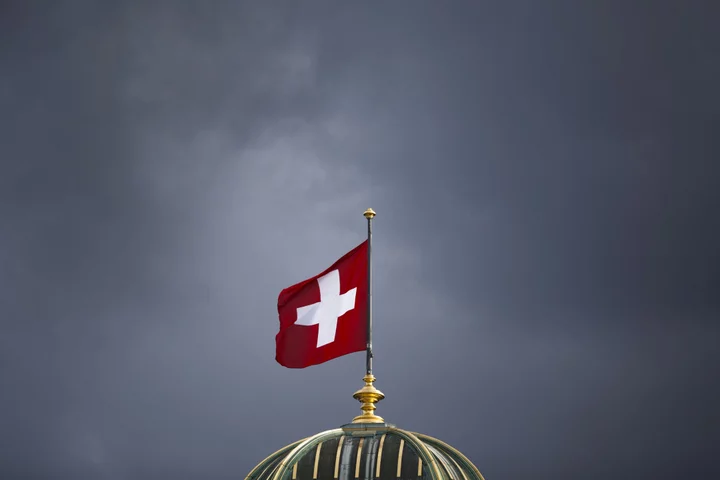Switzerland’s biggest political party wants to double down on neutrality, just as conflicts in Ukraine and the Middle East make a non-aligned stance more difficult to sustain.
The right-wing Swiss People’s Party, which is set to win the largest share of the vote in elections later this month, is seeking to collect 100,000 signatures by May to trigger a vote on whether to enshrine “everlasting” neutrality into the constitution. That would allow it to roll back sanctions against Russia that won praise from US President Joe Biden.
Click here for a German version of this story. Subscribe to our German daily newsletter Fünf Themen des Tages.
The Kremlin, on the other hand, says Switzerland is no longer a neutral state — a criticism that touches a nerve with the nation of 8.9 million people.
More than 90% of the population still supports neutrality. For the Swiss, an impartial stance is a “national myth of almost religious consecration,” according to Edgar Bonjour, who wrote several volumes on the history of neutrality. While Finland recently joined the NATO military alliance and Sweden seeks to do the same, that prospect is unthinkable in Switzerland.
However, the Kremlin’s assault on Ukraine and Hamas’s attack on Israel are exposing the contradictions of Swiss neutrality, which can be traced back to medieval cantons hiring out mercenaries to warring European states, without taking sides. This week, the government backed labeling Hamas a terrorist organization, taking a further step away from its non-aligned status.
Some Swiss commentators want Switzerland to go further, and warn that a strict neutrality risks deterring foreign investment.
“Neutrality only made sense when our neighbors in Europe were constantly at war, and so it’s not really in the best interest of Switzerland anymore,” said Thomas Borer, a former Swiss diplomat who in the late 1990s led the government’s task force examining Swiss banking’s role during the Nazi era. “If we had not supported sanctions, then we would really have lost business.”
Read More: Swiss Government Backs Labeling Hamas as Terrorist Organization
A perpetual Swiss neutrality was enshrined at the Treaty of Paris in 1815, after the defeat of Napoleon. Switzerland follows the legal obligations imposed on neutral states by the 1907 Hague Conventions.
A history of political fence-sitting barely survived World War II, when Switzerland violated its own neutrality by granting loans and selling arms to Nazi Germany. The neutral nation — while helping wounded soldiers and children — also sealed its borders to thousands of Jewish refugees.
The People’s Party, which has previously defended the country’s decision to turn away at least 20,000 people fleeing the Nazis, cites history to bolster its advocacy of neutrality.
“History shows it: Switzerland has not meddled in foreign affairs and was largely spared in World War II,” reads the party’s program for upcoming national elections.
While none of the biggest political parties oppose neutrality, the Social Democrats has warned that Switzerland mustn’t hide behind it and should be an advocate of international law and human rights. The conservative Center Alliance has expressed similar sentiments, saying that the country mustn’t play into the hands of an aggressor under the pretext of neutrality.
The People’s Party neutrality initiative was spurred by its opposition to the Swiss government’s decision to follow European Union sanctions on Russia.
“You make Switzerland de facto a henchman for foreign interests in our own country,” party lawmaker Roger Koeppel said during a parliamentary debate last month. “You are corroding prosperity, you are attacking the middle class, and you are damaging the dignity and reputation of our country.”
Imposing sanctions means raising bilateral trade costs, while being neutral lowers those costs because you can do business with anyone, according to Stefan Legge, head of tax & trade policy at the Institute for Law and Economics at the University of St. Gallen. At the same time, with more than half of its trade being with Western-allied nations, Switzerland couldn’t afford to be entirely neutral, he said.
“Being neutral is beneficial, political allegiances come at a cost,” said Legge. “What has helped Switzerland is not wanting to shape or educate the world, but rather to just do business.”
For More: Credit Suisse Collapsed, Switzerland Returned to Making Money
However, Russia’s invasion of Ukraine has exposed the risks of Swiss neutrality for some businesses. Switzerland doesn’t allow locally made arms to be sent to conflict areas by buyers, as part of its longstanding neutrality rules. Contrary to the breaches in WWII, the country has been blocking weapon shipments from Germany, Spain and Denmark to Ukraine, drawing international criticism.
That’s threatening the viability of Switzerland’s small, but symbolically important, arms industry, which has been a cornerstone of the nation’s so-called armed neutrality.
“It’s a tightrope walk, but at the moment we risk companies with key technologies in the defense sector leaving the country,” said Jan Atteslander, foreign business chief of economiesuisse, which represents Swiss industry.
Read More: Switzerland’s Ruag Chief Exits Arms Maker After Neutrality Spat
The latest debate on neutrality is also informed by wider security considerations, and the geographical good fortune of Switzerland being surrounded by friendly European nations. Unlike Finland, which fought two wars against Soviet troops, the Alpine nation is far from Russian front lines.
“The average Swiss thinks correctly that life is kind of cosy and the big bad Russian bear that weighed on the minds of Swedes and Finns, doesn’t really feature around Switzerland,” said Jacob Kirkegaard, senior fellow at the Peterson Institute for International Economics. “The Swiss are willing to look the other way, but that’s nothing new.”
--With assistance from Kati Pohjanpalo.
Author: Bastian Benrath, Hugo Miller and Dylan Griffiths

